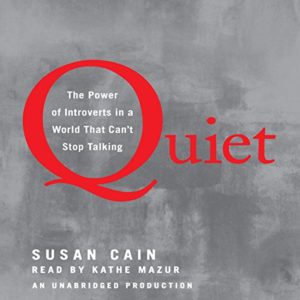Sales Tax Institute Book Club: Quiet by Susan Cain
In our most recent edition of the Sales Tax Institute Book Club, our staff all took part in some self-reflection of two particular personality styles: introversion and extroversion. Before a team can thrive, the individuals making up the team must know what they each need based on their personality traits and characteristics in order to contribute at their best. The majority of our team is made up of introverts, and introverts are often misunderstood.
To understand how best to support introverts in the workplace and beyond, we read Susan Cain’s Quiet: The Power of Introverts in a World That Can’t Stop Talking. Cain shed light on the cultural narratives and scientific data surrounding introversion and extroversion to help change how we see introverts and understand the unique strengths of this personality style.

A Culture Set Up for Extroverts
Cain argues that American culture is set up around the “Extrovert Ideal” – which she describes as “the omnipresent belief that the ideal self is gregarious, alpha, and comfortable in the spotlight.” This ideal has impacted how we set up our workplaces, make hiring decisions, raise children, and who we choose as our heroes.
This cultural bias may have impacted your idea of what it means to be an introvert. You might have learned that an extrovert is someone who feels energized around others and that introverts are energized by being alone, making them less sociable. Extroversion is often seen as the favorable quality because extroverts are more likely to speak up in meetings, be outgoing in leadership positions, and feel comfortable in large groups.
“Introverts are drawn to the inner world of thought and feeling, extroverts to the external life of people and activities. Introverts focus on the meaning they make of the events swirling around them; extroverts plunge into the events themselves.”
– Carl Jung
In a culture that favors extroversion, what introverts have to offer can fly under the radar. But we would be remiss to overlook the powerful ways introverts can contribute to all sectors of society.
The Power of Introverts
For extroverts, here’s what you need to know about the power of introverts. For introverts, let us help you recognize its benefits.
“We don’t need giant personalities to transform companies. We need leaders who build not their own egos but the institutions they run.”
– Susan Cain
The root of introversion is that these people are more highly reactive to their environments. They are generally more aware of the details and nuances of what is going on around them. Introverts take time to compare choices before making a decision and think and feel deeply about what they notice. This can come across to extroverts as a shortcoming because they do not expose their ideas externally as quickly. However, their thoughts are given more time to develop and create meaning. Introverts often gravitate towards professions that allow for solitary environments and value deep internal thought.
Introverts are deep thinkers who use their time in solitude to innovate and develop new ideas or critique old ones. Without introverts, we would not have the artists, scientists, or writers that have moved cultures forward for centuries. Introverts are more likely to arrive at a networking event and only speak to a couple people, but the connections they build are strong and long lasting.
Introverts can be great leaders even if they aren’t the gregarious, larger-than-life archetype. Introverts tend to have a few key passions by nature and rise into leadership positions due to demonstrated dedicated commitment to their work. Introverts value the exchange of ideas and listen well to employees who bring ideas forward and may be more open to running with those ideas.

Understanding Ourselves and One Another
Introverts and extroverts are equally important in our world today. The benefits of each type of personality can be embraced at the same time and we need both styles.
In the workplace, introverts may feel more uncomfortable asserting themselves in meetings, presenting to crowds, or networking with a room full of people they don’t know. To rise to these challenges, introverts can push themselves into a pseudo-extroverted state for a period of time. However, we can only stretch our personalities up to a certain point. Our inborn temperaments influence us regardless of the lives we lead. A sizable part of who we are is ordained by our genes, brains, and nervous systems and cannot be altered. Free will helps us shape our personalities to meet certain societal expectations.
Some of us have the self-monitoring trait. Self-monitors are highly skilled at modifying behavior to meet social demands of a situation. Even with this ability, in order to feel comfortable with oneself, it’s good to find the sweet spot for where you are optimally stimulated. So, it is critical for introverts and extroverts to each consider the other’s needs and meet somewhere in the middle. That might look like more hours working on projects alone and less time in group meetings or working from home a couple days a week and less time at the office.
When you better understand your limits, you can increase your satisfaction in work and at home. The place you go when you want to return to your true self, physical or temporal, is called your “restorative niche.” Introverts and extroverts need these. Can you identify your restorative niche?
“The secret to life is to put yourself in the right lighting. For some it’s a Broadway spotlight; for others, a lamplit desk.”
– Susan Cain
The takeaway is to remember coworkers may have different needs, preferences, and styles than you do based on where they are on the introvert vs. extrovert continuum. Do what you can to learn what helps them thrive so you can communicate well and hit goals together. The best ideas might come from the quietest person if enough space and time is allowed.
If you’ve read Quiet: The Power of Introverts in a World That Can’t Stop Talking and have thoughts or insights on how being an introvert or extrovert has impacted your professional life, we’d love to hear!. Email us here.
Next, the Sales Tax Institute will take on Across That Bridge by John Lewis. We’d love to have you join us on our next journey. We encourage you to support your independent local bookstores. Our neighborhood bookstore is Sandmeyer’s Bookstore in historic Printer’s Row Chicago. Join us and support your own favorite local store!